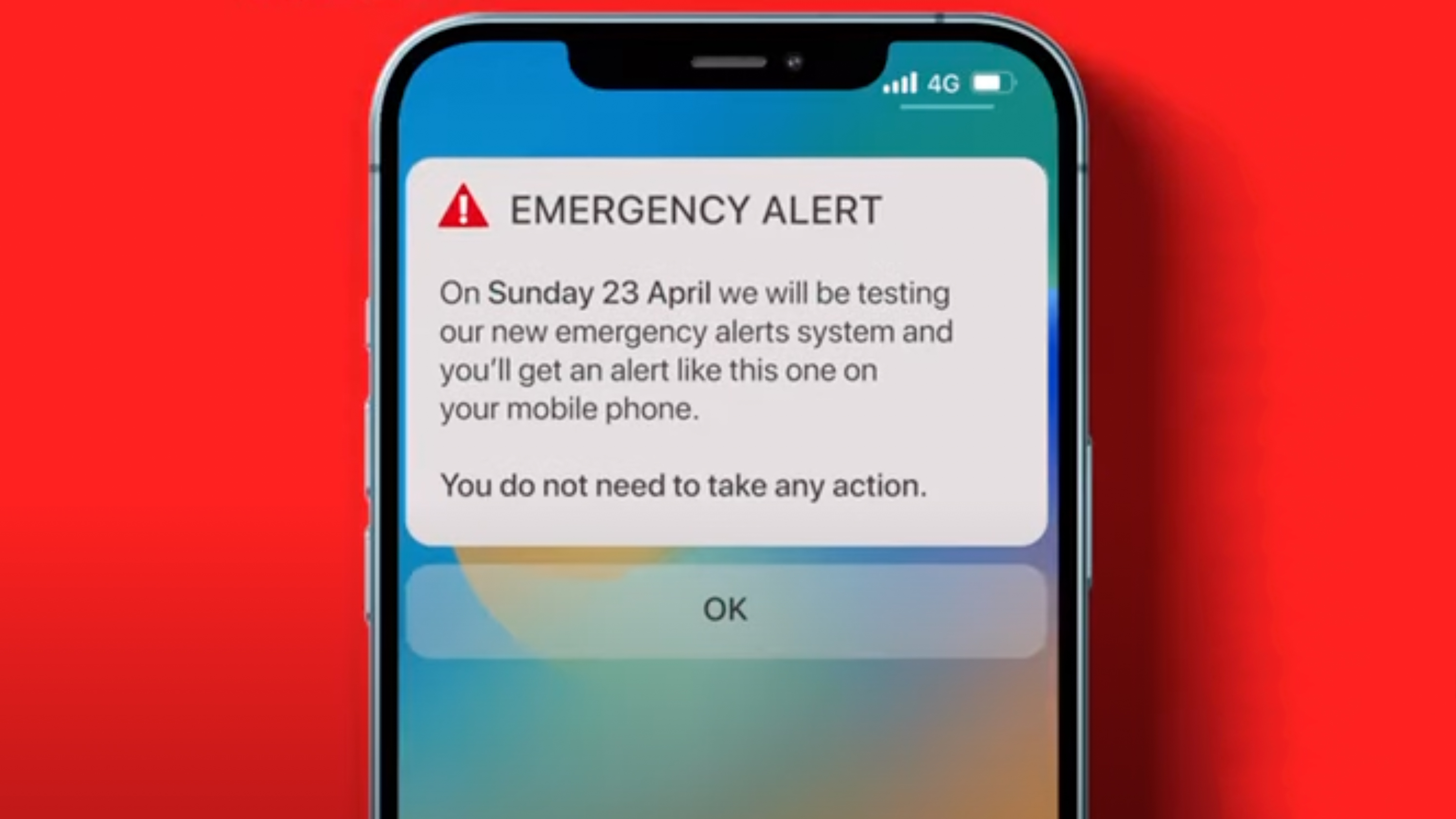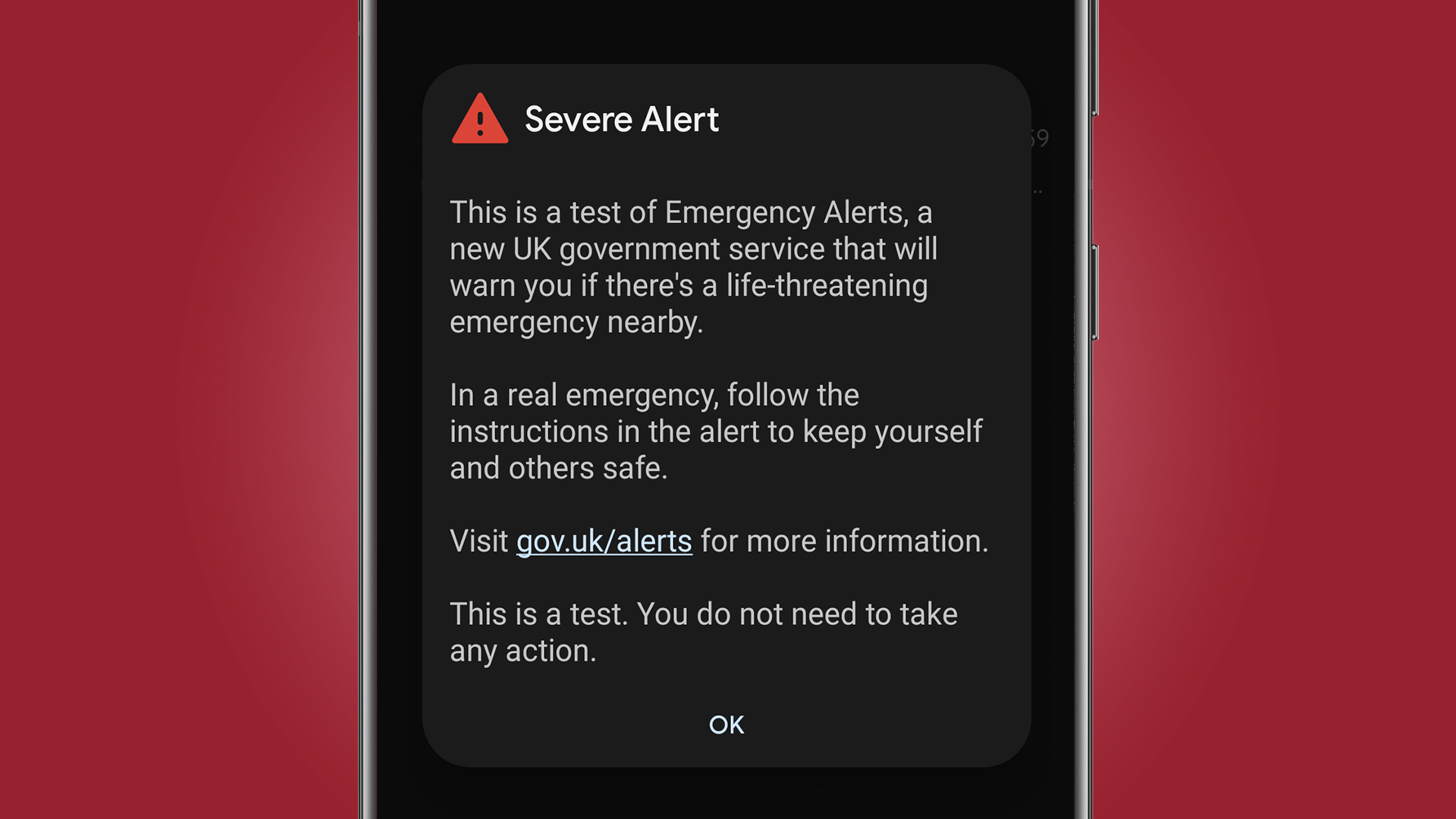Didn't get the UK emergency alert? Here are 5 possible reasons why
The mobile networks explain why you didn't get the alert

Sign up for breaking news, reviews, opinion, top tech deals, and more.
You are now subscribed
Your newsletter sign-up was successful
Update 24/4/23: Three has now given us an official statement, so we've updated our story. You can find it below in the the first section titled 'You're on Three' below.

If you got the emergency alert, it will have been pretty hard to miss it – the siren-like sound is designed to be arresting and hard to ignore. But if you were away from your phone or want to double-check to see if it came through, it's possible to see your alert history on Android. On Android phones, just go to Settings > Notifications > Emergency Alerts > Emergency alert history.
If you live in the UK and didn't get the emergency alert that was broadcast to 4G and 5G smartphones at 3pm BST on Sunday April 23, you're not alone. So what went wrong, and how can you make sure you get them in the future?
The UK's Cabinet Office has acknowledged that not everyone received the alert as planned and is working out why. It said that while "the vast majority of compatible phones received the alert", it's also aware that "a very small proportion of mobile users on some networks did not receive it" and that "it will be looking at this as part of our review of the test".
Right now, it isn't clear exactly how many people didn't receive the test alert, which was broadcast across England, Northern Ireland and Scotland, and was a practice for future alerts that could help warn you about severe flooding, fires or extreme weather.
Further information:While the vast majority of compatible phones received the alert, we are aware that a very small proportion of mobile users on some networks did not receive it and will be looking at this as part of our review of the test.April 23, 2023
But anecdotal evidence on social media (and among the TechRadar team) suggests that Three customers were, in particular, affected by technical issues that meant they didn't receive the siren-like alarm. The network has admitted that there were some issues and we've asked it for further comment on why Three may have been affected.
If you didn't receive the emergency alert, the UK government has opened an official survey where you can leave feedback to help it improve next time. But we've also rounded up the top five other potential reasons why you may not have received the alert this time – and how to make sure you do so in the future.
5 reasons why you didn't receive the UK emergency alert

1. You're on Three
While customers on all of the UK's mobile networks have reported not getting the UK emergency alert test, the most widespread issues were on Three – and so far the network is the only one to officially acknowledge an issue.
Sign up for breaking news, reviews, opinion, top tech deals, and more.
In a Tweet (below), it said that it was aware that "a number of customers" didn't receive the alert and it's "working closely with the government" to understand why.
We're aware that a number of customers have not received the test alert. We're working closely with the government to understand why and ensure it doesn't happen when the system is in use.April 23, 2023
Anecdotally, most of the TechRadar team members (bar two) who are on Three didn't receive the emergency alert test, and the network has now given us an official statement.
A Three spokesperson told us: "Following the emergency alerts test yesterday, working with the government we identified a technical issue that meant some of our customers did not receive an alert. This morning our engineers deployed a fix that means that there will be no issue with future alerts.”
While that's comforting for Three customers, we've asked Three exactly what the technical issue was and will update this story when we hear back. This variation between networks may partly be explained by the fact that the emergency alert had to pass through the rebroadcasting processes of each mobile networks, but hopefully Three will give us some specifics on exactly what caused its hiccup.
2. You weren't getting a 4G or 5G signal
Beyond the potential for network-related issues, there are a few technical reasons why you may not have received the emergency alert test – with one of those being the lack of a 4G or 5G signal.
This is something O2 has pointed out to some of its customers, with its FAQs stating that you might not receive an alert when "a device connects to a 3G or 2G signal". Vodafone also told customers to check its network status checker, to make sure they were getting 4G in their area.
Hi there, there are some factors which might mean you will not receive an alert. You can find more information under the FAQs here ➡️ https://t.co/oWGuc7Z4G3April 24, 2023
This doesn't just apply to phones that don't have 4G connectivity. O2 says "this can often happen inside buildings" and that "a device needs to be on 4G or 5G to receive the alert".
Naturally, this means that all non-4G devices were also ruled out of getting the alert, so that's a factor worth checking if a family member didn't receive it.
3. Your phone software isn't up to date
Another reason why a phone or tablet may not have received the UK emergency alert test is because it was running an older, unsupported version of iOS or Android.
As EE has been pointing out to customers, to be capable of receiving alerts (both the test one and future alerts), your iPhone needs to be running iOS 14.5 or later, while Android phones need to be on Android 11 or later.
This will only affect phones that are pretty old – for example, the iPhone 6S from 2015 supports iOS 14, while the likes of the Google Pixel 2 support Android 11.
But it's possible that, in some cases, a phone didn't receive the alert because it was simply too old to run those OS versions, or hadn't been updated recently enough.
4. You didn't have emergency alerts turned on
Most iOS and Android phones have the ability to receive emergency alerts turned on by default, but in some cases it's possible this option may have been turned off.
We explained how to disable the UK emergency alert test for those who didn't want their Sunday afternoon nap ruined. But if you expected to receive the alert and didn't, then it's worth following those steps (as suggested by EE below) to make sure your phone's set up to receive them.
If your software is up to date, please use the following steps to ensure alerts are on.Settings > Search for “emergency alerts” OR Settings > Notifications > Advanced Settings > Emergency Alerts - MeganApril 24, 2023
After searching for 'emergency alerts' on Android (which may also be called 'Wireless emergency alerts' on some phones), you should see a toggle for 'Allow alerts'. This obviously needs to be turned on for you to receive them.
It's a similar process on iPhone – just go to Settings > Notifications, then scroll all the way down the page to the 'Emergency Alerts' section, where you can check to make sure that 'Extreme Alerts' and 'Severe Alerts' are both toggled on.
5. You phone was on Airplane mode
While a lack of 4G or 5G coverage at the time of the test is a more likely reason why your phone didn't receive the emergency alert, another possibility is that your device was in Airplane mode.
We suspect that most TechRadar readers won't need to be reminded of this potential factor, but if someone you know didn't get the alert, it could be worth checking that their compatible iOS or Android device wasn't accidentally left in Airplane mode.
On iOS, you can find this by swiping down at the top of the screen and checking to make sure the plane icon isn't highlighted, and it's the same on Android (swipe down and open the Quick Settings panel to check).

Mark is TechRadar's Senior news editor. Having worked in tech journalism for a ludicrous 17 years, Mark is now attempting to break the world record for the number of camera bags hoarded by one person. He was previously Cameras Editor at both TechRadar and Trusted Reviews, Acting editor on Stuff.tv, as well as Features editor and Reviews editor on Stuff magazine. As a freelancer, he's contributed to titles including The Sunday Times, FourFourTwo and Arena. And in a former life, he also won The Daily Telegraph's Young Sportswriter of the Year. But that was before he discovered the strange joys of getting up at 4am for a photo shoot in London's Square Mile.